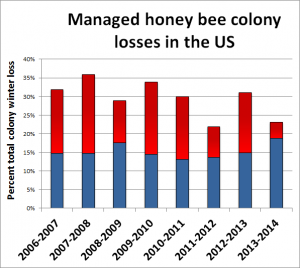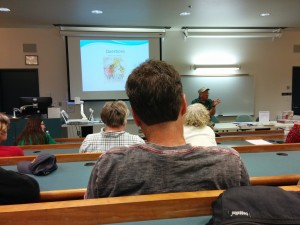Last night I went to a talk by Dr. Dewey Caron presented by the Carroll County Beekeepers Association. It was held at the Carroll Community College library. It was a great location and a nice room for a presentation. It was also a regular monthly meeting for the CCBA, but club business was limited to about 10 or 15 minutes. There were about 40 people there (just my guess) including three or four from FCBA. I sat with Rose A.
Dr. Caron spoke primarily about hive losses, overwintering losses in particular. He was pushing the efforts of the Bee Informed group. He presented lots of slides of the research done since 2006 with an emphasis on the work that was online for the past four or five years. He encouraged us to participate in this year’s survey which opens up in April. You can go to the website and sign up now for an email reminder of when the survey starts.
 His bottom line was that regardless of what the actual loss numbers were, they are always well above what the beekeepers say are acceptable, sustainable losses and that is a problem. Overwintering losses have been pretty consistent at 25 – 35%, but higher for backyard keepers. The survey includes some large operations as well as backyard beekeepers. There are also losses other than over winter, so when you look at total losses for just backyard beekeepers, the yearly losses are close to 50%.
His bottom line was that regardless of what the actual loss numbers were, they are always well above what the beekeepers say are acceptable, sustainable losses and that is a problem. Overwintering losses have been pretty consistent at 25 – 35%, but higher for backyard keepers. The survey includes some large operations as well as backyard beekeepers. There are also losses other than over winter, so when you look at total losses for just backyard beekeepers, the yearly losses are close to 50%.
Varroa mites were a focus of the talk, both as a stressor in their own right, but also as a vector for viruses. Anything that can be done to reduce the mite load will help the colony. Dr. Caron went through most of the common treatments for Varroa, citing the effectiveness. All of this data comes from beekeepers through the Bee Informed survey. He prefaced his talk with a discussion about how this survey is not a random sample and not scientific in some respects. They attempt to correlate single actions with outcomes when these actions are not checked. They are unverified responses from the survey.
The second bullet on his list was about queens. He believes that a lot can be done to improve overwintering by managing queens more effectively. One of the things that can be done is survivor selection. He also believes that new queens are more vigorous and hardier through the winter and probably lay better in the fall producing winter bees. Russian and various hygienic queens also help.
Other bullet items included nutrition, pesticides and viruses. He suggested that the colony size should be between 20,000 and 30,000 and that too many bees might be detrimental although he didn’t elaborate on that.
It was an interesting talk and it reenergized me a bit to continue to work toward queen selection. I also bought Dr. Caron’s book, Honey Bee Biology and Beekeeping. It is a very nice book that was published in 1999 and updated in 2013.
